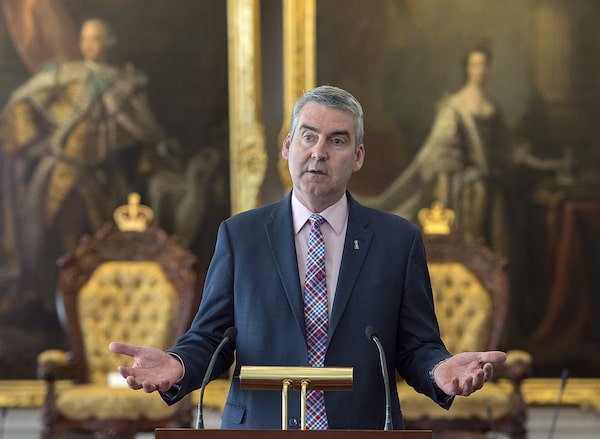
Nova Scotia Premier Stephen McNeil attends a bill briefing at the legislature in Halifax on April 2, 2019.Andrew Vaughan/The Canadian Press
Minority representation at Nova Scotia’s lone medical school is getting a boost through the addition of 16 new training seats dedicated for rural, black and Indigenous students.
Dalhousie University will get four new first-year spots for the fall term and another 12 for the 2020-21 academic year, Premier Stephen McNeil said Thursday.
The government will invest $300,000 this year for the new seats and its annual contribution will increase to $4.8 million by the 2023-24 school year for the extra spaces, he said. With the 16 new spots, Dalhousie will have a total of 94 first-year medical training seats.
McNeil said it is “critical for our children today to see themselves in every facet of our workplace.”
“More Mi’kmaq students need to be involved, more African Nova Scotians need to be involved, more of our daughters need to be involved in all of our institutions to ensure that they reflect who we are,” he said.
Dr. David Anderson, dean of the Faculty of Medicine, said the department currently has 440 students, including 13 African Nova Scotians and 12 Indigenous students.
Anderson said minorities represent about two or three per cent of the faculty’s student body – although none, he said, are from Nova Scotia’s main Indigenous group. There are currently no status Mi’kmaq medical students and it’s a “gap we need to address,” he said.
“A lot of this is on us,” Anderson said. “We’ve got to get out to those communities and work with community leaders, with schools, public officials and doctors … to make students understand that it’s a very achievable goal to become a doctor.”
Anderson said it’s important the medical profession reflects the diversity of the general population.
“When a patient goes to see a physician it’s great that they can see themselves in that person, someone who understands where they are coming from and the challenges they are dealing with.”
In addition to creating more space for minority students, the province is also increasing enrolment to address doctor shortages, especially in family medicine. Nearly 52,000 Nova Scotians don’t have a family doctor, according to provincial data.
Anderson said Dalhousie’s goal is to have 50 per cent of its graduates opt for family medicine.
“If we get Dal students moving into Dal residencies, that’s our greatest opportunity to have those doctors come back and stay here,” he said.
The first four seats announced Thursday have already been filled by Nova Scotia students from rural communities.
McNeil said the emphasis on attracting rural medical students is also important because physician shortages are most acute in smaller communities throughout the province.
“Medical schools are like the country, they’ve become urbanized,” he said. “So in order to attract physicians to rural communities they have to have some level of experience in those communities, otherwise they will stay in the urban parts of our country.”